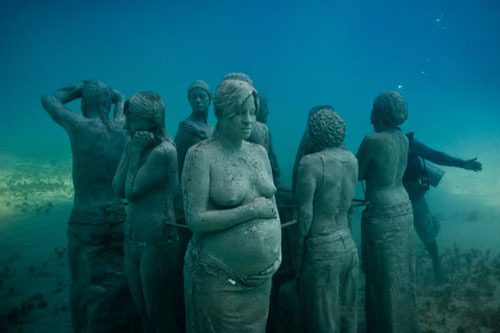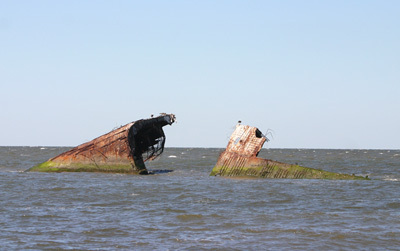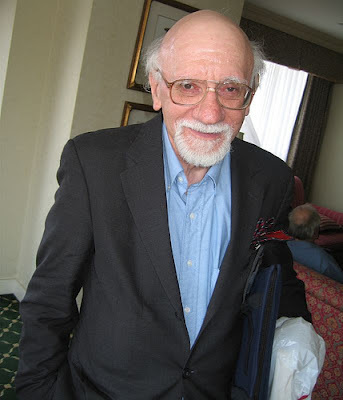Michael Swanwick's Blog, page 185
August 31, 2012
Beasts of the Southern Wild
.

I don't have time to write a full review, but I'd be doing you a disservice if I didn't commend Beasts of the Southern Wild to your attention.
Despite some very tasty images, such as the above, this is not really a fantasy -- or if it is, it's only a fantasy in the sense that any movie in which life proves to be impossibly hospitable is a fantasy. And there's no getting around the fact that the plot is almost as shambolic as the charmingly hammered together sets. But it has a stunning performance by then-six-year-old Quvenzhane Wallis and tons and tons of heart.
So what happens? The marsh Eden called Bathtub is a refuge for what Rebecca Ore calls "wild humans" -- people who live in extreme poverty but in recompense get to live exactly as and how they wish, with not a second thought for authority of any kind. But a hurricane, an ill-advised attempt to save their community by blowing up a levee, and meddling government do-gooders threaten to to separate young Hushpuppy (Quvenzhane) and several other girls from their homes and families. Bad things happen. Good things happen. There's a happy ending.
The ending is kind of beside the point, though. The charm of this movie is in its moment-by-moment depiction of lives spent in the kind of freedom that most of us can only fantasize about. Also in its visual beauty. Squalor has never looked more attractive than this.
I have to wonder, though. According the credits, the movie was based (surely loosely) on the play Juicy and Delicious Lucy Alibar. What on earth can that play be like?
*

I don't have time to write a full review, but I'd be doing you a disservice if I didn't commend Beasts of the Southern Wild to your attention.
Despite some very tasty images, such as the above, this is not really a fantasy -- or if it is, it's only a fantasy in the sense that any movie in which life proves to be impossibly hospitable is a fantasy. And there's no getting around the fact that the plot is almost as shambolic as the charmingly hammered together sets. But it has a stunning performance by then-six-year-old Quvenzhane Wallis and tons and tons of heart.
So what happens? The marsh Eden called Bathtub is a refuge for what Rebecca Ore calls "wild humans" -- people who live in extreme poverty but in recompense get to live exactly as and how they wish, with not a second thought for authority of any kind. But a hurricane, an ill-advised attempt to save their community by blowing up a levee, and meddling government do-gooders threaten to to separate young Hushpuppy (Quvenzhane) and several other girls from their homes and families. Bad things happen. Good things happen. There's a happy ending.
The ending is kind of beside the point, though. The charm of this movie is in its moment-by-moment depiction of lives spent in the kind of freedom that most of us can only fantasize about. Also in its visual beauty. Squalor has never looked more attractive than this.
I have to wonder, though. According the credits, the movie was based (surely loosely) on the play Juicy and Delicious Lucy Alibar. What on earth can that play be like?
*
Published on August 31, 2012 10:56
August 30, 2012
Remembering Josepha Sherman
.

I went to New York City yesterday for a memorial service for Josepha Sherman, who died recently after a long illness. Josepha was a prolific writer, an editor, a folklorist, and the co-author of (among many other books, mostly written solo) Greasy Grimy Gopher Guts: The Subversive Folklore of Childhood . I've got a copy here on my desk and, unlike most such books, it really is genuinely, cheerfully subversive.
As was Josepha. I wasn't a close friend -- not like most of the people who showed up last night. But I enjoyed her company and she clearly enjoyed her life. Every time I saw her, she was just enjoying the heck out of the situation, whatever it might be.
Listening to her friends relate fond memories, I couldn't help thinking of how in some ways she and I were opposites. I never know how to respond to gifts, for one thing. When somebody gives me something, I stand tongue-tied until Marianne nudges me and says, "Say thank-you, Michael."
I suspect that Josepha never had to be told to say thank-you. She knew that life is a gift and she was continuously grateful for it.
Now that gift has come to an end. But the memories remain, the friends remain, the community she was a part of remains. Rest in peace, Joespha. You left some good things behind.
Including at least one book so subversive I can't quite find the guts to quote it here.
*

I went to New York City yesterday for a memorial service for Josepha Sherman, who died recently after a long illness. Josepha was a prolific writer, an editor, a folklorist, and the co-author of (among many other books, mostly written solo) Greasy Grimy Gopher Guts: The Subversive Folklore of Childhood . I've got a copy here on my desk and, unlike most such books, it really is genuinely, cheerfully subversive.
As was Josepha. I wasn't a close friend -- not like most of the people who showed up last night. But I enjoyed her company and she clearly enjoyed her life. Every time I saw her, she was just enjoying the heck out of the situation, whatever it might be.
Listening to her friends relate fond memories, I couldn't help thinking of how in some ways she and I were opposites. I never know how to respond to gifts, for one thing. When somebody gives me something, I stand tongue-tied until Marianne nudges me and says, "Say thank-you, Michael."
I suspect that Josepha never had to be told to say thank-you. She knew that life is a gift and she was continuously grateful for it.
Now that gift has come to an end. But the memories remain, the friends remain, the community she was a part of remains. Rest in peace, Joespha. You left some good things behind.
Including at least one book so subversive I can't quite find the guts to quote it here.
*
Published on August 30, 2012 07:35
August 29, 2012
"Slow Life" at Lightspeed
.

As always, I'm on the road again. But I have a story reprint online, courtesy of the good folks at Lightspeed .
The story is "Slow Life," which was originally published in Analog . Here's how it begins:
Which is why I determined to start by tracing the fall of a raindrop from the upper atmosphere to the surface of Titan. It was a lot of work. It was a lot of fun. And when Stan Schmidt bought it, his acceptance letter noted that normally Analog didn't accept stories with that much technical detail in them.
I may well have that letter engraved on my tombstone.
You'll find the interview here. And the story here.
*

As always, I'm on the road again. But I have a story reprint online, courtesy of the good folks at Lightspeed .
The story is "Slow Life," which was originally published in Analog . Here's how it begins:
The raindrop began forming ninety kilometers above the surface of Titan. It started with an infinitesimal speck of tholin, adrift in the cold nitrogen atmosphere. Dianoacetylene condensed on the seed nucleus, molecule by molecule, until it was one shard of ice in a cloud of billions.When I first decided to write "Slow Life," I wanted to make it as hard-science -fiction-feeling as possible. So I went back to the early Larry Niven collectiions to see how he'd done it . . . and discovered that a lot of his early stories began with a brief lecture on physics. Not what they teach you at Clarion -- and yet it worked.
Which is why I determined to start by tracing the fall of a raindrop from the upper atmosphere to the surface of Titan. It was a lot of work. It was a lot of fun. And when Stan Schmidt bought it, his acceptance letter noted that normally Analog didn't accept stories with that much technical detail in them.
I may well have that letter engraved on my tombstone.
You'll find the interview here. And the story here.
*
Published on August 29, 2012 06:48
August 28, 2012
Chicago's Italo Balbo Monument
.

I won't be attending the Worldcon this weekend. But for those who are, here's a neglected corner of history you might be interested in looking up while you're in Chicago: The Italo Balbo monument. This is a memento, and perhaps the only enduring one, of the 1933-1934 Century of Progress World's Fair, hosted by Chicago.
"One of the highlights of the fair," my source writes, "occurred when Italian aviator Italo Balbo led a squadron of 24 Savoia-Marchetti SM.55X flying boats in a historic transatlantic flight from Rome to Chicago, landing on Lake Michigan near the fairgrounds." To mark the occasion, Mussolini contributed a Roman column. On the monument, in Italian and English, is the inscription:
Italo Balbo was an interesting, if not very admirable man. He was part of the quadrumvirate that brought Mussolini to power, in recognition of which he was made the minister of Italy's air force. At the time he didn't know how to fly, but apparently he was a quick learner. He died in 1940, in an air accident, the victim of friendly fire in Libya. Despite the occasional call for its removal, his monument remains, neflected, in Burnham Park, east of Soldier Field.
You can read about it here.
*

I won't be attending the Worldcon this weekend. But for those who are, here's a neglected corner of history you might be interested in looking up while you're in Chicago: The Italo Balbo monument. This is a memento, and perhaps the only enduring one, of the 1933-1934 Century of Progress World's Fair, hosted by Chicago.
"One of the highlights of the fair," my source writes, "occurred when Italian aviator Italo Balbo led a squadron of 24 Savoia-Marchetti SM.55X flying boats in a historic transatlantic flight from Rome to Chicago, landing on Lake Michigan near the fairgrounds." To mark the occasion, Mussolini contributed a Roman column. On the monument, in Italian and English, is the inscription:
This column, twenty centuries old, was erected on the beach of Ostia, the port of Imperial Rome, to watch over the fortunes and victories of the Roman triremes. Fascist Italy, with the sponsorship of Benito Mussolini, presents to Chicago a symbol and memorial in honor of the Atlantic Squadron led by Balbo, which with Roman daring, flew across the ocean in the 11th year of the Fascist era.
Italo Balbo was an interesting, if not very admirable man. He was part of the quadrumvirate that brought Mussolini to power, in recognition of which he was made the minister of Italy's air force. At the time he didn't know how to fly, but apparently he was a quick learner. He died in 1940, in an air accident, the victim of friendly fire in Libya. Despite the occasional call for its removal, his monument remains, neflected, in Burnham Park, east of Soldier Field.
You can read about it here.
*
Published on August 28, 2012 07:14
August 27, 2012
Now That Neil Armstrong is Gone . . .
.
Now that Neil Armstrong is no longer with us, one third of all the human beings who ever walked on the Moon are dead.
Nobody, not even J. G. Ballard called this one -- that after our biggest success in what was then called the Space Race, with a world that has since grown continually more wealthy and technologically advanced, we would simply stop sending human beings to other worlds.
This is the point at which, as a science fiction writer, I'm supposed to launch into a jeremiad about the failure of nerve of our culture and science fiction's enabling role in not providing sufficiently moving myths to overcome that failure of nerve.
But it is always better to understand than to complain. So let's consider why we haven't sent another man (or the first woman) beyond low Earth orbit in the last forty years.
The big culprit here is Earth's gravity well. It takes an enormous amount of energy to break free of it and that energy is tremendously expensive. The first modern science fiction writers imagined that space travel, once achieved, would become progressively more efficient and less expensive, the same way that land travel, sea travel, and air travel had. It was a good model and up through Apollo 17, everything looked to be right on track.
But (damn physics!) manned space exploration remains extraordinarily expensive and looks like it will be so for the foreseeable future.
The lesser culprit is the lack of a goal compelling enough to make a nation sink that kind of money into manned space exploration. China has plans for a manned Moon landing . . . but they're doing it for the same reasons the United States did in the late Sixties and early Seventies. To prove that they're a major world power capable of extraordinarily difficult and expensive feats.
The U.S. has already proved that with Apollo 11. That's an accomplishment which, like Yuri Gagarin's first flight into space, cannot be taken away from a nation. In order to keep going, after the prestige has been gained, there must be other reasons.
In the old science fiction model, space flight would become increasingly cheap, more and more people would be able to afford it, and they'd take off for parts unknown for a variety of reasons, both self-serving and idealistic. To mine the asteroids, the build Lunar colonies, the terraform Mars, to escape an overcrowded Earth. None of which looks likely to happen anytime soon.
So at the present time the arguments for manned space exploration are:
1. Scientific curiosity.
2. The prestige of doing so.
3. "Because it's there."
Which apparently aren't enough.
Manned orbital missions, you'll note, are doing just fine. That's because there are a lot of military and economic reasons for having an orbital presence. We'll have manned missions to other planets as soon as we can come up with a strong reason for them. One that's strong enough to convince, let's say, Mitt Romney and Barack Obama that serious money should be committed to it.
I don't have that reason. But some years ago John Barnes explained how we could find one. Send out thousands of small, cheap probes, he said, to every part of the Solar System. Let them gather information. Build a data base of that information. And when that data base is large enough, it will tell us why we should send human beings out into space.
To which I can only say, Amen.
*
Now that Neil Armstrong is no longer with us, one third of all the human beings who ever walked on the Moon are dead.
Nobody, not even J. G. Ballard called this one -- that after our biggest success in what was then called the Space Race, with a world that has since grown continually more wealthy and technologically advanced, we would simply stop sending human beings to other worlds.
This is the point at which, as a science fiction writer, I'm supposed to launch into a jeremiad about the failure of nerve of our culture and science fiction's enabling role in not providing sufficiently moving myths to overcome that failure of nerve.
But it is always better to understand than to complain. So let's consider why we haven't sent another man (or the first woman) beyond low Earth orbit in the last forty years.
The big culprit here is Earth's gravity well. It takes an enormous amount of energy to break free of it and that energy is tremendously expensive. The first modern science fiction writers imagined that space travel, once achieved, would become progressively more efficient and less expensive, the same way that land travel, sea travel, and air travel had. It was a good model and up through Apollo 17, everything looked to be right on track.
But (damn physics!) manned space exploration remains extraordinarily expensive and looks like it will be so for the foreseeable future.
The lesser culprit is the lack of a goal compelling enough to make a nation sink that kind of money into manned space exploration. China has plans for a manned Moon landing . . . but they're doing it for the same reasons the United States did in the late Sixties and early Seventies. To prove that they're a major world power capable of extraordinarily difficult and expensive feats.
The U.S. has already proved that with Apollo 11. That's an accomplishment which, like Yuri Gagarin's first flight into space, cannot be taken away from a nation. In order to keep going, after the prestige has been gained, there must be other reasons.
In the old science fiction model, space flight would become increasingly cheap, more and more people would be able to afford it, and they'd take off for parts unknown for a variety of reasons, both self-serving and idealistic. To mine the asteroids, the build Lunar colonies, the terraform Mars, to escape an overcrowded Earth. None of which looks likely to happen anytime soon.
So at the present time the arguments for manned space exploration are:
1. Scientific curiosity.
2. The prestige of doing so.
3. "Because it's there."
Which apparently aren't enough.
Manned orbital missions, you'll note, are doing just fine. That's because there are a lot of military and economic reasons for having an orbital presence. We'll have manned missions to other planets as soon as we can come up with a strong reason for them. One that's strong enough to convince, let's say, Mitt Romney and Barack Obama that serious money should be committed to it.
I don't have that reason. But some years ago John Barnes explained how we could find one. Send out thousands of small, cheap probes, he said, to every part of the Solar System. Let them gather information. Build a data base of that information. And when that data base is large enough, it will tell us why we should send human beings out into space.
To which I can only say, Amen.
*
Published on August 27, 2012 08:08
August 25, 2012
Jason deCaires Taylor in Collaboration with God
.

Robert Lewis Stevenson put it best:
Our time are so rich with creative energy that wonderful things can be known to all the world and yet not impinge themselves on our awareness. It was only last night, trolling the Web for art profound enough to influence my next fantasy novel, that I discovered Jason deCaires Taylor and his astonishing undersea sculpture garden.
I'd have to see it in person to be able to judge the sculptures. But viewed second-hand, they remind me of Kyle Cassidy's photos. Rather than using artifice to create an artificial standard of beauty, he photographs people as they really are . . . and reveals the beauty inherent therein.
So too, here. But then the artist hands his work over to God and says, "Do what thou wilt." Or as Shaxper put it:
You can best appreciate the work here.
*

Robert Lewis Stevenson put it best:
The world is so full of a number of things,
I am certain we all should be happy as kings.
Our time are so rich with creative energy that wonderful things can be known to all the world and yet not impinge themselves on our awareness. It was only last night, trolling the Web for art profound enough to influence my next fantasy novel, that I discovered Jason deCaires Taylor and his astonishing undersea sculpture garden.
I'd have to see it in person to be able to judge the sculptures. But viewed second-hand, they remind me of Kyle Cassidy's photos. Rather than using artifice to create an artificial standard of beauty, he photographs people as they really are . . . and reveals the beauty inherent therein.
So too, here. But then the artist hands his work over to God and says, "Do what thou wilt." Or as Shaxper put it:
Full fathom five thy father lies;
Of his bones are coral made;
Those are pearls that were his eyes:
Nothing of him that doth fade,
But doth suffer a sea-change
Into something rich and strange.
You can best appreciate the work here.
*
Published on August 25, 2012 00:30
August 24, 2012
Kids! Don't Try This At Home
.

Some writing advice is stranger than others. The oddest useful advice I can think of is this: Don't listen to the Guyoto Monks while writing .
The Gyoto Monks are the Dalai Lama's crack spiritual troops, best known for the fact that they can chant in chords. Individually, I mean. Scientists who have looked into this say that clearly what is going on is that they hold the larynx motionless at the first and second resonance points. Then, like a plucked guitar string held motionless at those same points, the result is a chord. Exactly how they learn to do this is a mystery because scientists and Buddhist monks simply do not speak the same language.
It is claimed -- and I believe it -- that listening to the Gyoto Monks chant raises your mind to a higher spiritual level. Again, there's some speculation about alpha, beta, and gamma brain waves, but the explanation still eludes modern science.
The reason I believe the claim is that I used to listen to music on headphones while I wrote. One day I put on a tape I'd just bought of the Gyoto Monks chanting and began to write. As they chanted, I grew increasingly calm and peaceful. And I stopped writing.
I got up and got a cup of coffee, did a couple of minor chores around the house, went back and started writing again, still listening to the monks. I started out with a clatter of keys, slowed, stilled . . . stopped.
This happened several times. The chanting would raise me to a higher level of consciousness in which I no longer desired to write. Writing, it appears, is an inherently low form of consciousness. Possibly, it may even be sinful.
I mentioned this to a writer friend and he said, "Yeah, the same thing happened to me. Eventually, I had to throw the tape away to get any writing done at all."
Which is what I did.
The monks, most likely, would tell me that my spiritual well-being is more important than anything I might write. But, as with the scientists, they and I simply do not speak a common language.
And for those of you who are big Kindle readers . . .
Somebody over on Facebook alerted me that Amazon has The Best of Michael Swanwick available in Kindle format for three bucks. For a collection of stories that took me over a quarter-century to write, that's pretty cheap.
You can find it here.
*

Some writing advice is stranger than others. The oddest useful advice I can think of is this: Don't listen to the Guyoto Monks while writing .
The Gyoto Monks are the Dalai Lama's crack spiritual troops, best known for the fact that they can chant in chords. Individually, I mean. Scientists who have looked into this say that clearly what is going on is that they hold the larynx motionless at the first and second resonance points. Then, like a plucked guitar string held motionless at those same points, the result is a chord. Exactly how they learn to do this is a mystery because scientists and Buddhist monks simply do not speak the same language.
It is claimed -- and I believe it -- that listening to the Gyoto Monks chant raises your mind to a higher spiritual level. Again, there's some speculation about alpha, beta, and gamma brain waves, but the explanation still eludes modern science.
The reason I believe the claim is that I used to listen to music on headphones while I wrote. One day I put on a tape I'd just bought of the Gyoto Monks chanting and began to write. As they chanted, I grew increasingly calm and peaceful. And I stopped writing.
I got up and got a cup of coffee, did a couple of minor chores around the house, went back and started writing again, still listening to the monks. I started out with a clatter of keys, slowed, stilled . . . stopped.
This happened several times. The chanting would raise me to a higher level of consciousness in which I no longer desired to write. Writing, it appears, is an inherently low form of consciousness. Possibly, it may even be sinful.
I mentioned this to a writer friend and he said, "Yeah, the same thing happened to me. Eventually, I had to throw the tape away to get any writing done at all."
Which is what I did.
The monks, most likely, would tell me that my spiritual well-being is more important than anything I might write. But, as with the scientists, they and I simply do not speak a common language.
And for those of you who are big Kindle readers . . .
Somebody over on Facebook alerted me that Amazon has The Best of Michael Swanwick available in Kindle format for three bucks. For a collection of stories that took me over a quarter-century to write, that's pretty cheap.
You can find it here.
*
Published on August 24, 2012 11:55
August 23, 2012
Voyage to Atlantus (sic) and Back
.

It's Thursday, it's hot, and frankly my dear I don't give a damn. So I'm going down the Shore (as we say in these parts), rather than waste my day writing brilliant fiction you'd love to read. "Let's spend a day being perfectly predictable," I said to Marianne. "We'll drive to Sunset Beach" (where the concrete ship Atlantus -- that's how they spelled it -- above, sank) "and have lunch. Then we'll go to the beach in Cape May Point to swim and look for beach glass and do nothing constructive for several hours. After which, we'll go to the schooner American and order drinks (a martini for me) and a few plates of raw oysters. Then we'll go to the market at the Lobster House and buy seafood for dinner. And so home, possibly pausing en route to buy some fresh corn from a farm stand."
Rather than saying "But that's what we do every time," Marianne replied, "Okay."
We are well suited to each other, she and I.
And Tom Purdom chided me . . .
Gently, of course, because he is a gentleman, Tom Purdom called me on a point of fact and a point of nuance for yesterday's post. The point of fact was that Franco was never overthrown. He died peacefully, alas. It was careless of me to imply otherwise. But because the image of Tom Purdom, rapier in hand, slaying the monsters of histories is astonishingly cool, I'm going to pretend otherwise.
Factually, mind you, Tom is unerringly right. Always. Where he says one thing and I another, you should trust him unfailingly .
The point of nuance he wanted made was that the credit claimed devolved not to him but to all science fiction writers, myself (even) included. But, that being the point of what he wrote, I'm not willing to steal his insight. If you want to know what he actually meant, you'll have to read his essay. Here.
*

It's Thursday, it's hot, and frankly my dear I don't give a damn. So I'm going down the Shore (as we say in these parts), rather than waste my day writing brilliant fiction you'd love to read. "Let's spend a day being perfectly predictable," I said to Marianne. "We'll drive to Sunset Beach" (where the concrete ship Atlantus -- that's how they spelled it -- above, sank) "and have lunch. Then we'll go to the beach in Cape May Point to swim and look for beach glass and do nothing constructive for several hours. After which, we'll go to the schooner American and order drinks (a martini for me) and a few plates of raw oysters. Then we'll go to the market at the Lobster House and buy seafood for dinner. And so home, possibly pausing en route to buy some fresh corn from a farm stand."
Rather than saying "But that's what we do every time," Marianne replied, "Okay."
We are well suited to each other, she and I.
And Tom Purdom chided me . . .
Gently, of course, because he is a gentleman, Tom Purdom called me on a point of fact and a point of nuance for yesterday's post. The point of fact was that Franco was never overthrown. He died peacefully, alas. It was careless of me to imply otherwise. But because the image of Tom Purdom, rapier in hand, slaying the monsters of histories is astonishingly cool, I'm going to pretend otherwise.
Factually, mind you, Tom is unerringly right. Always. Where he says one thing and I another, you should trust him unfailingly .
The point of nuance he wanted made was that the credit claimed devolved not to him but to all science fiction writers, myself (even) included. But, that being the point of what he wrote, I'm not willing to steal his insight. If you want to know what he actually meant, you'll have to read his essay. Here.
*
Published on August 23, 2012 06:21
Voyage to (sic) Atlantus
.

It's Thursday, it's hot, and frankly my dear I don't give a damn. So I'm going down the Shore (as we say in these parts), rather than waste my day writing brilliant fiction you'd love to read. "Let's spend a day being perfectly predictable," I said to Marianne. "We'll drive to Sunset Beach" (where the concrete ship Atlantus -- that's how they spelled it -- above, sank) "and have lunch. Then we'll go to the beach in Cape May Point to swim and look for beach glass and do nothing constructive for several hours. After which, we'll go to the schooner American and order drinks (a martini for me) and a few plates of raw oysters. Then we'll go to the market at the Lobster House and buy seafood for dinner. And so home, possibly pausing en route to buy some fresh corn from a farm stand."
Rather than saying "But that's what we do every time," Marianne replied, "Okay."
We are well suited to each other, she and I.
And Tom Purdom chided me . . .
Gently, of course, because he is a gentleman, Tom Purdom called me on a point of fact and a point of nuance for yesterday's post. The point of fact was that Franco was never overthrown. He died peacefully, alas. It was careless of me to imply otherwise. But because the image of Tom Purdom, rapier in hand, slaying the monsters of histories is astonishingly cool, I'm going to pretend otherwise.
Factually, mind you, Tom is unerringly right. Always. Where he says one thing and I another, you should trust him unfailingly .
The point of nuance he wanted made was that the credit claimed devolved not to him but to all science fiction writers, myself (even) included. But, that being the point of what he wrote, I'm not willing to steal his insight. If you want to know what he actually meant, you'll have to read his essay. Here.
*

It's Thursday, it's hot, and frankly my dear I don't give a damn. So I'm going down the Shore (as we say in these parts), rather than waste my day writing brilliant fiction you'd love to read. "Let's spend a day being perfectly predictable," I said to Marianne. "We'll drive to Sunset Beach" (where the concrete ship Atlantus -- that's how they spelled it -- above, sank) "and have lunch. Then we'll go to the beach in Cape May Point to swim and look for beach glass and do nothing constructive for several hours. After which, we'll go to the schooner American and order drinks (a martini for me) and a few plates of raw oysters. Then we'll go to the market at the Lobster House and buy seafood for dinner. And so home, possibly pausing en route to buy some fresh corn from a farm stand."
Rather than saying "But that's what we do every time," Marianne replied, "Okay."
We are well suited to each other, she and I.
And Tom Purdom chided me . . .
Gently, of course, because he is a gentleman, Tom Purdom called me on a point of fact and a point of nuance for yesterday's post. The point of fact was that Franco was never overthrown. He died peacefully, alas. It was careless of me to imply otherwise. But because the image of Tom Purdom, rapier in hand, slaying the monsters of histories is astonishingly cool, I'm going to pretend otherwise.
Factually, mind you, Tom is unerringly right. Always. Where he says one thing and I another, you should trust him unfailingly .
The point of nuance he wanted made was that the credit claimed devolved not to him but to all science fiction writers, myself (even) included. But, that being the point of what he wrote, I'm not willing to steal his insight. If you want to know what he actually meant, you'll have to read his essay. Here.
*
Published on August 23, 2012 06:21
August 22, 2012
Tom Purdom, Hero of Liberty
.

Over at the Broad Street Review , illustrious Philadelphia science fiction writer Tom Purdom contemplates the future -- specifically his own future.
Tom doesn't think his stories, excellent though they are, have much chance of being assigned reading in future high schools or carefully scrutinized by future civilizations. Still, he reflects, they have had their influence. It was he, for example, who overthrew Generalissimo Francisco Franco. A small accomplishment, perhaps, but his own.
And, speaking personally, I am proud to be the friend of the man who overthrew Franco.
You can find out what I'm talking about by reading his essay here.
*

Over at the Broad Street Review , illustrious Philadelphia science fiction writer Tom Purdom contemplates the future -- specifically his own future.
Tom doesn't think his stories, excellent though they are, have much chance of being assigned reading in future high schools or carefully scrutinized by future civilizations. Still, he reflects, they have had their influence. It was he, for example, who overthrew Generalissimo Francisco Franco. A small accomplishment, perhaps, but his own.
And, speaking personally, I am proud to be the friend of the man who overthrew Franco.
You can find out what I'm talking about by reading his essay here.
*
Published on August 22, 2012 06:43
Michael Swanwick's Blog
- Michael Swanwick's profile
- 546 followers
Michael Swanwick isn't a Goodreads Author
(yet),
but they
do have a blog,
so here are some recent posts imported from
their feed.



